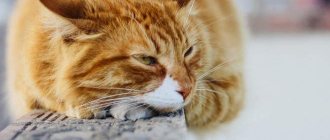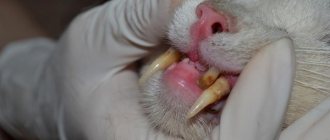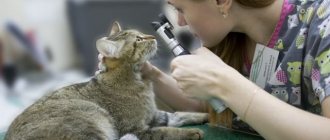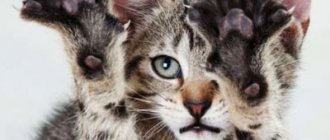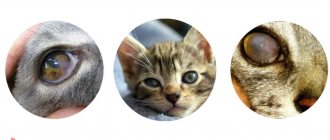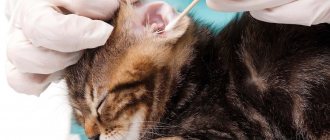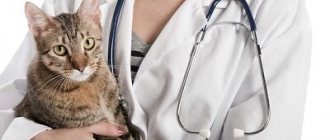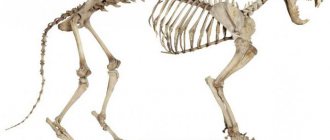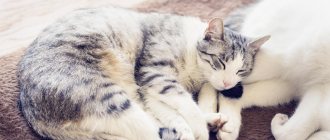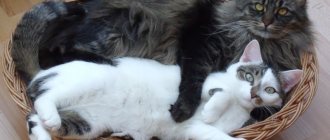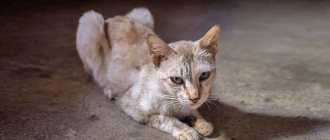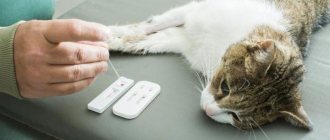Causes of bloating in adult cats
If your cat has a swollen belly and sides, possible causes may include:
- disturbances of intestinal microflora;
- inflammation;
- swelling;
- internal bleeding;
- tumors;
- parasites.
Bloating in a cat does not bode well.
Important! Only a doctor can make an accurate diagnosis after taking blood, urine and stool tests. If necessary, an ultrasound is performed.
Accumulations of air and gas
Aerophagy is the swallowing of air during food consumption. If your pet eats food particularly greedily, air gets in, forming bubbles inside.
Another common cause is excess gas production in the intestines. Most often it is associated with an incorrect or unbalanced diet. Foods that can cause bloating:
- fat and other meat waste;
- bread;
- milk;
- dairy products;
- feed with high soy content;
- wheat;
- corn.
The first three products are prohibited from being given to kittens and adult cats. Most dairy products cause flatulence in a kitten. The consumption of the rest should be halved. The accumulation of gases is caused by any spoiled food. Within the normal range, increased gas formation continues for 1-2 hours after eating, and then goes away.
Note! Bloating can be a sign of inflammatory diseases of the gastrointestinal tract, in particular intestinal diseases. If an enlarged tummy is accompanied by symptoms such as vomiting, diarrhea, refusal to eat, apathy and weakness, you should immediately take the animal to a veterinarian.
Fluid in the abdominal cavity
If your cat's stomach is bloated and his health is rapidly deteriorating, the problem may be fluid accumulation:
- urine;
- blood (internal bleeding);
- pus and exudate.
Stagnation can be triggered by injury, severe infection, or organ disease in the acute stage.
Overweight
Excess weight alone cannot cause bloating in a cat. The reason is a disruption in the functioning of the gastrointestinal tract. Often, abundant or unhealthy nutrition causes an imbalance of microflora.
As in people, it manifests itself as heaviness in the stomach, flatulence, and the intestines begin to growl. The number of good bacteria responsible for fermentation and digestion of food is reduced, and the bad bacteria that provoke putrefactive processes in the intestines increases.
Obesity itself is not the cause of a bloated belly.
Enlargement of any abdominal organ
In the presence of an inflammatory process, organ tissues can swell 2-3 times. Your pet's belly may swell due to inflammation or swelling of the liver, spleen, or kidneys.
Helminthiasis
A hard, distended belly is one of the signs of helminthiasis (infection with worms). In especially advanced cases, the number of parasites can be in the hundreds, which means additional weight and volume in the abdominal area. Prevention of infestation with medications should be carried out once a season, especially if the cat is often outdoors and in contact with other animals.
Important! Kittens born on the street become infected with helminths from the first days of life. Due to the ball of parasites, the animal's abdomen swells.
Enlargement of the uterus during pregnancy
Bloating in a pregnant cat causes the uterus to become enlarged. In most cases, changes in organ size occur within the normal range. A veterinarian can determine whether the size of the uterus corresponds to the animal’s gestational age.
Tumor
Malignant and benign tumors partially displace organs. In addition, tumors reduce the overall immunity of the body. Only a specialist can diagnose them using ultrasound and other techniques.
For your information! A condition when an animal can only lie down and sleep indicates the last stages of oncology.
Peritonitis
Another reason why a cat's stomach is swollen is peritonitis. This is a dangerous inflammation in the abdominal cavity. It is characterized by purulent and bloody discharge, as well as the outflow of fluid into the abdomen. The area becomes swollen and inflamed. Most often, the cat cannot even walk, eat or drink.
Peritonitis is common among older and recently born cats. In the second case, sterilization is recommended to prevent recurrent peritonitis. An advanced disease leads to irreversible inflammatory processes, internal bleeding, severe swelling, and organ ruptures.
Ascites
If a sick cat has a distended belly, ascites may be the cause. This is the release and accumulation of fluids in the abdominal cavity. Ascites occurs when any disease reaches an incurable stage. Most often, fluid accumulation occurs due to diseases of the gastrointestinal tract and genitourinary system. Modern medicine is not yet able to treat ascites. To alleviate the animal’s condition, the organ that caused the ascites is removed.
When should you contact a veterinarian to treat your cat?
If your pet exhibits symptoms such as vomiting, pain, and drooling along with a bloated belly, you should consult a veterinarian.
The doctor will prescribe the necessary tests and examinations (blood tests, ultrasound, x-rays, etc.), after which he will prescribe the appropriate treatment:
- A pathological condition such as pyometra requires immediate surgical intervention. During the operation, the doctor carefully removes the uterus along with the pus that has accumulated in it.
- If the abdomen has become enlarged due to infectious peritonitis, the doctor will prescribe supportive treatment: antibiotics and corticosteroids. Also, with the wet form of FIP, the fluid that accumulates in the abdomen is periodically pumped out.
- If a cat has an obstruction, the doctor will prescribe an immediate operation, during which the root cause of this condition (foreign body, tumor, etc.) will be eliminated.
Bloating does not always indicate a serious pathology.
In most cases, flatulence is the result of an incorrectly composed diet. The accumulation of gases in the intestines causes discomfort to the pet, so it is necessary to provide assistance to the animal as quickly as possible.
Symptoms
Seizures in a cat: causes, what to do, treatment
In most cases, bloating in a domestic cat signals the progress of the disease. To determine the nature of the bloat, you need to monitor other symptoms, as the veterinarian will need this information.
Sharp enlargement of the abdominal cavity
A sharp and strong increase in the abdomen indicates that it is not a matter of nutrition. Urgent hospitalization of the animal is required if the skin in the abdominal area is extremely stretched and the lower ribs are spread apart.
Inflammatory processes in the oral cavity
Inflammation in the mouth or other mucous membranes is a sign of exacerbation of the disease. Inflammations with purulent formations or severe swelling are especially dangerous.
Weight loss
If your cat has a bloated belly accompanied by weight loss, you should immediately take the cat for an examination. The most harmless reason for losing weight is worms. If your pet refuses to eat or loses weight, cancer may be the cause.
Presence of vomiting or diarrhea
Most often, diarrhea is a manifestation of problems with the gastrointestinal tract. Loose stools are formed due to weakened intestinal functions (decreased immunity, infections, etc.). Frequent trips to the toilet may be a consequence of poisoning or inflammatory processes in the digestive organs.
Vomiting is a clear signal that your pet’s body is fighting the disease. In this case, they must be accompanied by vomiting. Urging without vomiting indicates serious problems.
Decreased activity
An unusual decrease in activity is almost always a bad sign. An exception may be particularly hot days. At other times, apathy in a cat is a sign of deteriorating health. Often in such cases, cats strive for privacy and begin to growl if you approach them.
Excessive salivation
Constant swallowing, a wet neck and chin are a sign that the salivary glands have begun to work especially actively. The body tries to remove the infection through saliva. In addition, strong salivation provokes dehydration. Therefore, if, when bloated, the cat begins to breathe frequently and secrete a lot of saliva, you should immediately go to the veterinary clinic.
Excessive drooling in a cat is one of the key symptoms that you should definitely tell your doctor about.
Diagnosis of flatulence in cats
The small intestine is populated by colonies of friendly bacteria that “pull” nutrients, water, vitamins and microelements from foods. If food is completely digested, only waste products enter the large intestine that are not suitable for bacteria to feed on. However, if the foods are not completely digested and a source of carbohydrates (sugar) enters the intestines, microorganisms quickly colonize the feces and “eat up” the nutrients.
This is the nature of bacteria, they themselves “swell” after eating sugar, and the feeding process does not stop as long as there is a source of carbohydrates. It turns out that most of the microorganisms in the large intestine do nothing but eat and release gases that collect in the intestines. Depending on the amount of undigested food, the symptoms of flatulence are as follows:
- Regular involuntary release of gas.
- Against the background of gases, there is a slight swelling of the abdominal cavity, causing the animal tolerable discomfort.
- Pain, severe bloating, the abdominal wall is hard and tense. Diarrhea.
- Diarrhea, mucous discharge from the rectum, gases, acute pain, feces interspersed with blood.
Treatment methods
If a cat has a swollen belly, what should the owner do at home:
- palpate gently. The stomach should not be rock-hard, and touching should not cause painful sensations in the animal;
- remember what the pet ate and what medications the pet took over the past 3 days.
The cat's hind legs have failed: causes and treatment
If the animal remains active, can go to the toilet without problems and does not experience problems with bowel movements, it does not need to be taken to the clinic right away. However, in the following days, it is necessary to closely monitor the general condition of the cat and the degree of bloating in its abdomen.
Important! When a cat has a bloated stomach, many owners try to help and give a massage, but this is prohibited. If the cause is inflammation or fluid effusion, massaging the tummy will greatly aggravate the condition.
Nutrition correction
A bloated belly in a domestic cat can be treated with proper nutrition. The number and size of portions is calculated by the veterinarian based on the weight and age of the animal. If your pet eats ready-made food, you should pay attention to options for cats with gastrointestinal diseases or sensitive intestines.
Cats eating homemade food need to include boiled or baked vegetables (zucchini, peppers, tomatoes), fat-free meat and plenty of fresh water in their diet. You can add dietary supplements with natural fiber, which normalizes the functioning of the digestive organs.
Note! If your pet has a habit of eating food, you need to block access to the trash can and hide all food from the table.
Drainage of fluids from the abdominal cavity
If the condition is severe, the cat will need a drainage system, which is installed at the veterinary clinic. Drainage tubes are inserted into the abdominal cavity and excess fluid or blood is removed through them. The system is installed for several days. As a result, the amount of liquid collected per day should not exceed 50-100 ml. After this, the drainage is removed.
Diuretic
Diuretics remove excess fluid from the body through urine. Such treatment should be carried out under the supervision of a physician. Firstly, it puts a lot of stress on the kidneys. Secondly, with long-term use, diuretics wash out potassium and other elements, and also increase blood pressure.
Surgery
Internal bleeding, tumors and tears can be corrected with surgery. The sooner the owner consults a doctor, the easier it is to prevent the consequences of the disease.
Surgery is required as a last resort
Abdominal bloating in a domestic cat is not always a sign of illness. If the stomach is swollen for the first time, it is soft and touching does not cause pain in the cat, the cause may be improper nutrition or swallowing air. Symptoms such as general weakness, vomiting and diarrhea, a hard and hot stomach are dangerous and indicate an aggravated pathology. In this case, you should immediately take the cat to a veterinarian for examination.
How to rid a cat of flatulence
Treatment of chronic indigestion is a long process based on “experiments” with the diet, followed by tests to track trends.
If your cat has been suffering for years, consult a doctor if there are single manifestations:
- Enterosgel, activated carbon or Atoxil as an absorbent.
- Smecta, Almagel or analogues, to eliminate intestinal irritation.
- Espumisan or an analogue drug that gently removes gases from the intestines.
- Veterinary Baikal or other preparations with probiotics to repopulate the intestinal microflora.
- A diet of boiled rice in water or low-fat broth until flatulence is completely eliminated.
Natural cause
A cat may have a tight belly for natural reasons. So, in late pregnancy, due to a serious enlargement of the uterus, tension in the peritoneal muscles occurs. This phenomenon is necessary to prevent injury to the kittens. In this case, the cat does not require treatment, since this condition is natural.
The abdominal wall becomes especially hard before lambing, since at this moment all the muscles begin to tense, preparing the body for the birth of kittens. After their birth, the abdomen may remain hard for several hours, thus causing muscle spasm, which is a consequence of severe overload.
How to diagnose abdominal pain?
Your veterinarian will perform a physical examination of your cat and ask you about the cat's condition. He will want to know how long your cat has had abdominal pain, have you noticed other symptoms, what food is your cat eating, did he perhaps eat something he shouldn't?
Diagnostic tests will depend on the suspected cause, but may include:
- Abdominal ultrasound and/or x-ray to check organs for tumors, kidney stones, hernias, inflammation.
- Complete blood count, blood chemistry panel, and urine test to check organ function for signs of infection and/or inflammation.
- Stool tests for the presence of parasites.
